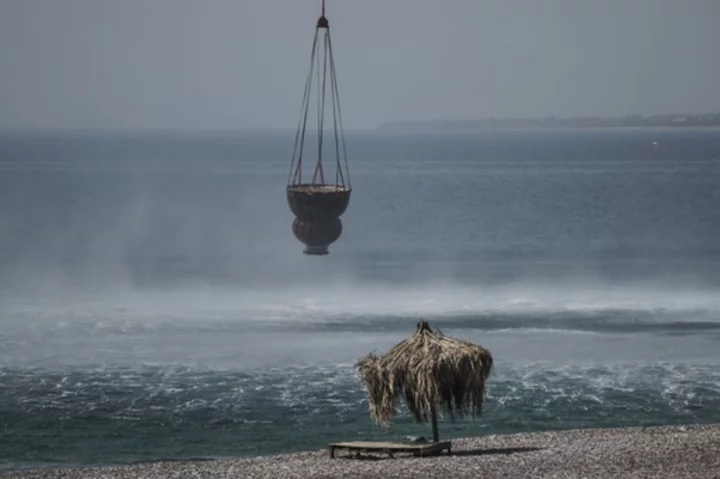RHODES, Greece (AP) — A wildfire whipped on by strong winds triggered a series of massive explosions Thursday at an air force ammunition depot in central Greece, and F-16 fighter jets were being moved from a nearby air base as a precaution while firefighters worked to tame multiple blazes in the country.
The Greek air force said the military base was not under an immediate threat. The depot was evacuated before the explosions, and no injuries were reported, although continued blasts prevented firefighting teams from approaching the site.
Fires have raged across parts of Greece during three successive Mediterranean heat waves in the past two weeks, leaving five people dead, including two firefighting pilots, and triggering a huge weekend evacuation of tourists on the island of Rhodes.
The fire in the Volos area of central Greece's Magnissia region reached the ammunition storage facility about 6 kilometers (4 miles) north of the major military air base in Nea Anchialos. Local media reported that bombs and ammunition for Greek F-16 fighters were stored at the site.
The large explosions shattered windows on houses in a surrounding area, but the Greek fire service said no injuries were reported in nearby villages, which also were evacuated as a precaution.
Fire Service spokesman Ioannis Artopios said 12 villages were ordered evacuated in the Volos-Nea Anchialos area.
“Despite their superhuman efforts, our forces were unable to stop the blaze,” he said.
Artopios said the Volos area blaze was the most dangerous of the 124 wildfires the fire service had to deal with Thursday.
The wildfire burned on three fronts and forced a section of Greece’s busiest highway to close for several hours, while national rail services passing through the area were delayed.
State ERT television showed residents and visitors in the coastal village of Anchialos, some 4 kilometers (2 1/2 miles) from the blast site, being evacuated by sea, while others were leaving in cars and buses.
The mayor of the city of Volos, Achilleas Beos appealed to all remaining village residents to obey the evacuation order, saying some 80% had left. The coast guard said dozens of residents were taken in small private boats to the city of Volos.
The Nea Anchialos air base is some 20 kilometers (12 miles) from the city, where the blasts were heard loudly. The air force said that while the facility was not immediately threatened, some of the F-16 fighters based there were taking off for other air bases as a precaution.
Water-dropping helicopters and a ground crew scrambled early Thursday to a separate wildfire in Kifissia, just north of Athens, which was quickly put out.
Greek firefighters also battled flames for a 10 successive day on Rhodes, where officials said the blazes were largely contained. Flare-ups were reported on the island of Evia.
The World Meteorological Organization, a U.N. body, and a European Union climate change service reported Thursday that temperatures during the first three weeks of July set a new global heat record.
As Southern Europe fights extreme heat and wildfires, parts of central Europe have been hit with winter conditions. Subfreezing temperatures, frost and snow have been reported in the Tatra Mountains, which run through Poland and Slovakia.
In Italy, firefighters battled brush fires in the southern mainland regions of Calabria and Puglia, as well as the islands of Sicily and Sardinia, helped by temperatures dropping some 13 degrees Celsius (55 degrees Fahrenheit) into the low- and mid-30s C (high 80s F).
Sicily remained the focal point, with fires continuing to burn near the capital, Palermo.
“Without doubt, we can see that all across the Mediterranean the climate crisis is here, and it’s affecting us all more strongly than perhaps even scientists had warned us about,” Greek Prime Minister Kyriakos Mitsotakis said Thursday during a meeting with Greece's president, Katerina Sakellaropoulou.
Wildfire carbon emissions for July in Greece were the highest by a huge margin — totaling over 1 metric megatons and doubling the previous record — since record-keeping started 20 years ago, according to the EU agency that analyzes satellite data, the Copernicus Atmosphere Monitoring Service.
“Unfortunately, it is not all that surprising, given the extreme conditions in the region,” said Mark Parrington, a senior scientist at the agency. “The observed intensity and estimated emissions show how unusual the scale of the fires has been for July relative to the last 20 years of data.”
In Athens, senior members of the armed forces paid tribute to the two pilots killed when a firefighting plane crashed this week, at a ceremony held at the Defense Ministry.
Capt. Christos Moulas and Lt. Pericles Stephanidis died during a low-altitude water drop on the island of Evia. Defense Minister Nikos Dendias said they had shown “self-denial in the line of duty.”
“Greece today is in mourning. Their memories will live on,” Dendias said.
Funeral services for the two airmen were to be held in northern Greece later Thursday and on the island of Crete on Friday. ___
Gatopoulos reported from Athens. Associated Press writers Colleen Barry in Milan, Italy, and Venessa Gera in Warsaw, Poland, contributed to this report.
___
Associated Press climate and environmental coverage receives support from several private foundations. See more about AP’s climate initiative here. The AP is solely responsible for all content.
___
Follow AP’s coverage of climate issues at https://apnews.com/climate-and-environment









